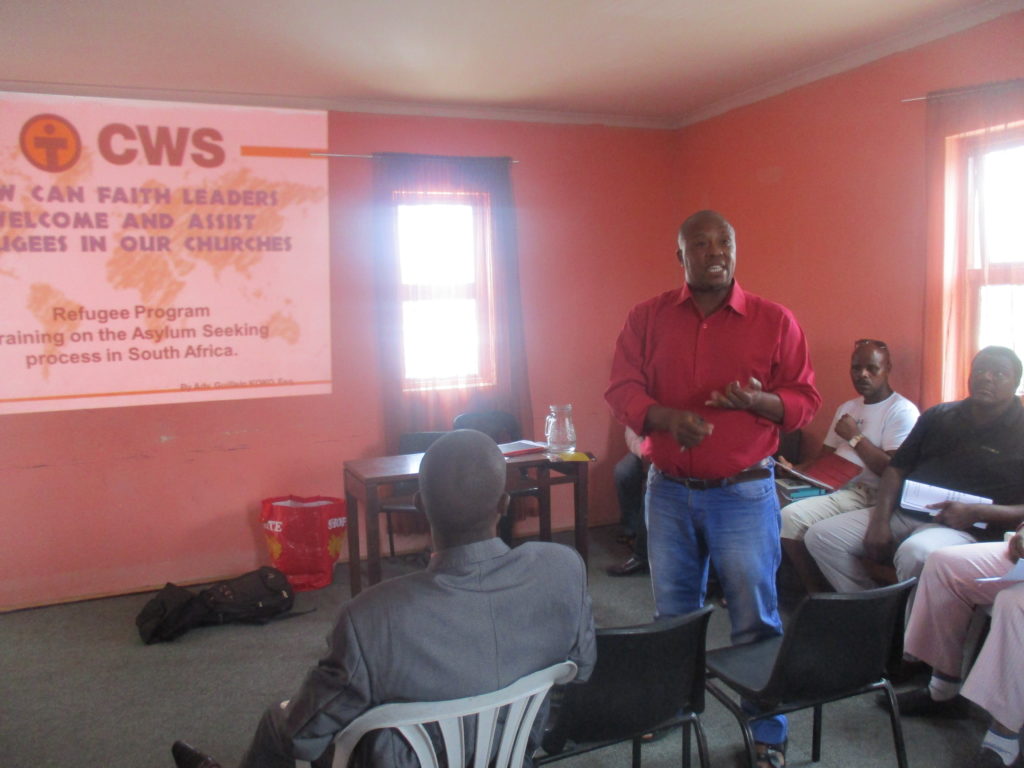
Training sessions in South Africa discuss ways to engage with faith audiences to create safe spaces for sexual minority refugees and asylum seekers.
This July 18th, colleagues from around the world will join the Church World Service Pretoria office in celebrating the International Mandela Day for Freedom, Justice and Democracy. To prepare for the day, the CWS Safe Space Program in South Africa has conducted trainings with faith leaders on how to create safe spaces for LGBTI refugees living in South Africa. Roughly 30 faith leaders, LGBTI refugees and asylum seekers came together on the 12th of July in Shoshanguve, Pretoria to participate in the session.
Under this year’s Safe Space theme: ‘Take action! Inspire change’, faith leaders in Pretoria West pledged to take action and affect change for the better treatment of asylum seekers and refugees. Specifically, they focused on sexual minority refugees and asylum seekers who continue to endure daily hardships. Individuals regularly suffer from social exclusion by ethnic and faith community associations, a lack and denial of documentation from the South African Department of Home Affairs, hate crimes, xenophobic sentiment or attacks, homophobic and transphobic attacks, and are at risk from at times their fellow refugees and also the local community. Sexual minority refugees, especially lesbian and transgender women are particularly vulnerable to sexual violence, including so-called “corrective rape.”
Talking about the Mandela day, Reverend Tsepo from Maranatha Church urged his fellow pastors to honor the legacy of Nelson Mandela and speak for the voiceless. He echoed the imperative to oppose the injustice that is taking place against LGBTI persons, saying, “Mandela devoted 67 years of his life to the service of humanity and helping others; as men of God, we are expected to do more.”
This year’s training sessions walked attendees through potential policy changes put forth in a recent international migration policy paper by the South African Department of Home Affairs, Asylum Program. The session took time to guide church ministers, deacons and pastors through the potential policy updates, with participants expressing their concerns or any changes that would deny the right to work and study for asylum seekers. Participants also discussed the possibility that all asylum seekers will be required to reside in the Lebombo Refugee Camps, jeopardizing the safety of sexual minority refugees and worsening the living condition of many asylum seekers.
This year the CWS Safe Space Program has trained faith leaders to enhance protection of sexual minority refugees, shift the homophobic viewpoints, and bring persons of faith towards a collective action that aims at making the faith space a safe space for LGBTI asylum seekers and refugees. The program was first established in 2014 along with two other Safe Spaces Programs in the United States and Kenya.
While working with several local, regional and international key partners, such as the South African Council of Churches, the South African Human Rights Commission, Inclusive Affirming Ministry and the Global Interfaith Network, the program has so far engaged with close to 300 different faith leaders throughout Gauteng, Western Cape and Kwazulu Natal Provinces. Additionally, the program is part of the National Task Team on Hate Crime Against LGBTI Persons, a platform designed by the Department of Justice & Constitutional Development.
Guillain Koko is the Safe Space Program Officer for the CWS Africa Relief, Development and Protection Program.
